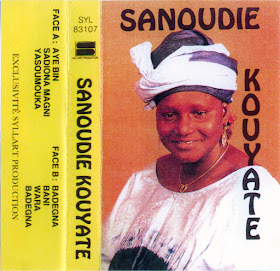 He would have been 74 today. And although he has been dead for over 20 years now, and even the circumstances surrounding his death (such as where he died, and his last concert in Amsterdam) are getting blurred* in the mist of time, he remains a legend, a source of inspiration both for musicians and for the many, many, many passionate lovers of his music and of the passion and assertiveness of his guitar playing.
He would have been 74 today. And although he has been dead for over 20 years now, and even the circumstances surrounding his death (such as where he died, and his last concert in Amsterdam) are getting blurred* in the mist of time, he remains a legend, a source of inspiration both for musicians and for the many, many, many passionate lovers of his music and of the passion and assertiveness of his guitar playing. And I count myself amongst those.
Of course I don't need an excuse to post another album by Franco and his orchestre O.K. Jazz.
And especially when it concerns this one. Volume 4 is from the In Memoriam series released by Polygram, Kenya in 1989, shortly after Franco's death. This album contains a truly varied selection of songs from the early 1970s/late 1960s. Four of the eight songs are composed by Franco himself, and one each by Kwamy, Youlou, Celi Bitshou and Vicky.
Franco is at it from the start, with some trademark shuffles in the opening track "Claude" and over 2 minutes of unadulterated 'mipanza' (or 'knitting'), as Franco would call his guitar style.
Franco's second composition "Tembe Na Tembe" may at first seem like more of the same, but after listening to it a few times you will notice the totally different approach: it is like Franco is on tiptoes, with almost casual notes from his guitar, - until he just flutters off after 1'51....
More ecstacy in the third track "Caisse D'Epargne". I suspect the song is about a savings bank, but the music can certainly not be labelled as 'frugal', let alone dull. This is one of the very few songs in this period featuring a drum kit. The O.K. Jazz used a drum kit in their live performances but found it hard to use in the studio. The reason is quite obvious, given that recordings were done in one take. The - skipping - result in this song is quite satisfactory, but only because Franco's contribution on guitar is minimal. Chécain's voice seems to act as a counterpoise for the jubilant horns.
After the jubilation of "Caisse D'Epargne" the contrast with the following "Lola" only adds to the dramatic impact of this superb bolero by one of my favourite bolero singers with the O.K. Jazz: Kwamy. I have asked several musicians of the O.K. Jazz about the guitarists in this song, and the general opinion appears to be that in fact two guitarists are playing the lead: Franco and Brazzos. In my opinion there is no doubt that Franco is the one responsible for that 'stab to the heart' at 3'41.....
Please note, by the way, that Kwamy's last whispers at the very end of the song are missing in the CD version (Sonodisc CD 36603).
Like "Lola" the tracks on side B can be found on CD's. In the case of Youlou Mabiala's "Celina" this is actually an improvement as the version on CD 36586 is in stereo and (subsequently) sounds more open. "Patience" was released on CD 36581 as "Mwasi Tata Abali Sika".
In the case of "Mokili Matata" the CD version is even harder to trace, as it is credited on the CD (the same as the previous track) to Franco. This is incorrect.
It is wise to take good note of all tracks composed by Celi Bitshou. His best known composition is of course "(Infidelité) Mado", but other tracks like "Mokolo Ya Pasi" and "Nazali Kitoko Mingi" (on that great CD 36514) show his incredible talent for arranging and for the dramatic. And the same goes for this "Mokili Matata". Franco's rhythmic interaction with the percussion and the rhythm guitar is - again - brilliant.
The last track is really an 'odd one out'. The song was recorded as the very first song of Vicky's Viclong label. As such it was the first step on the way to the separation between Franco and Vicky, with as you may remember from this earlier post a B-side entitled "J'ai trompé mon amour". An indication of things to come, one might say.
GMFLP 004
And as an extra celebrational bonus I am adding this incredible video, posted by Aboubacar Siddikh.
*and talking about blurred: the writer of this article appears to be the last in a word-of-mouth line with several deaf people in it....


